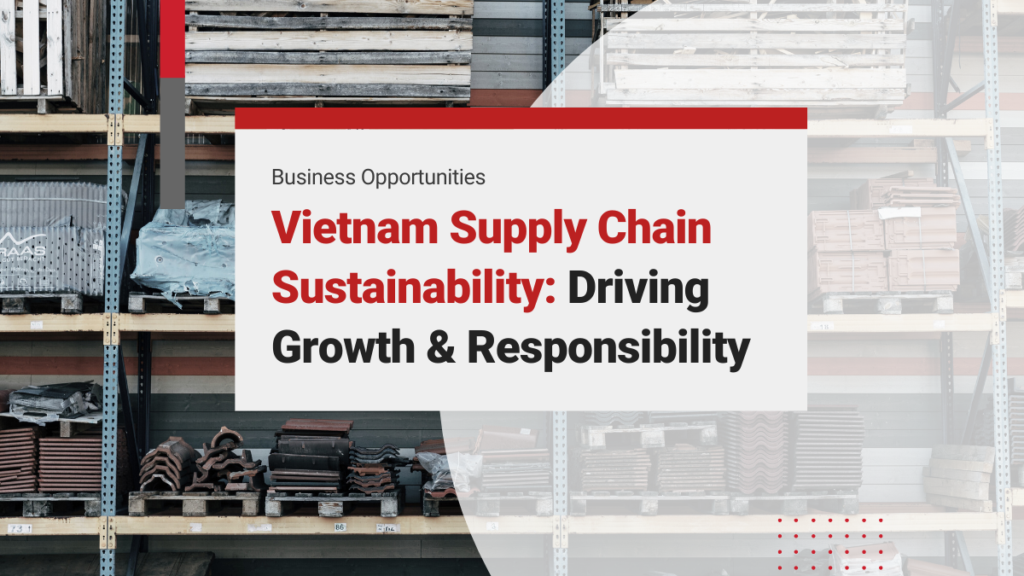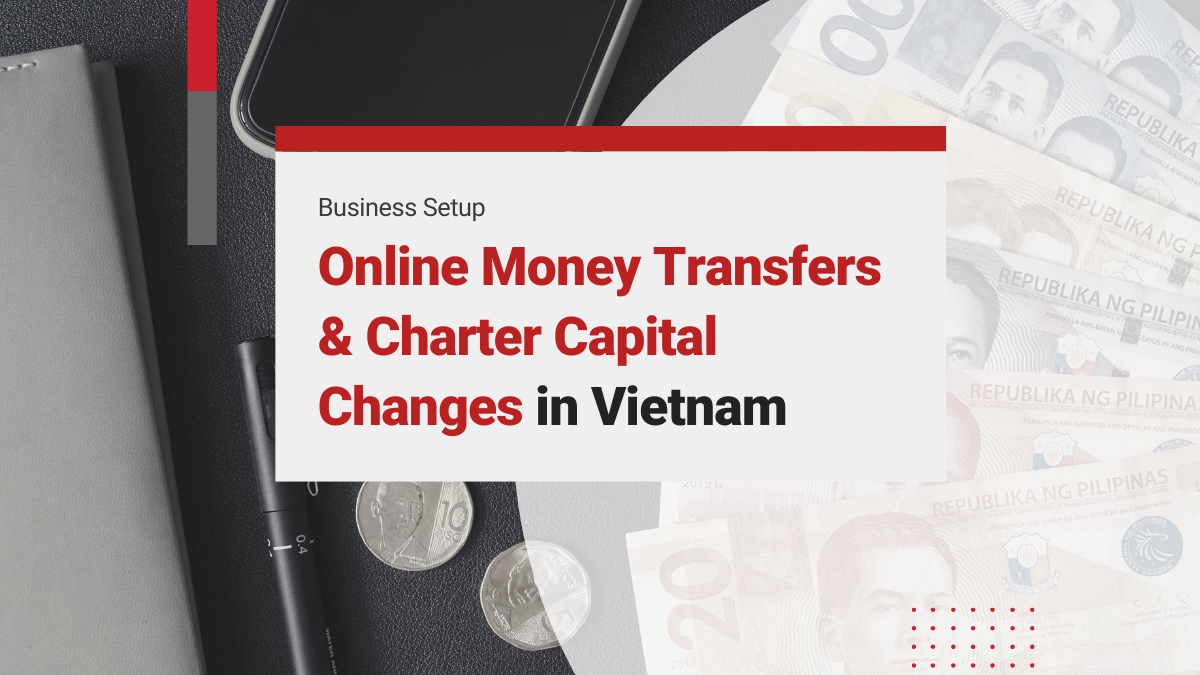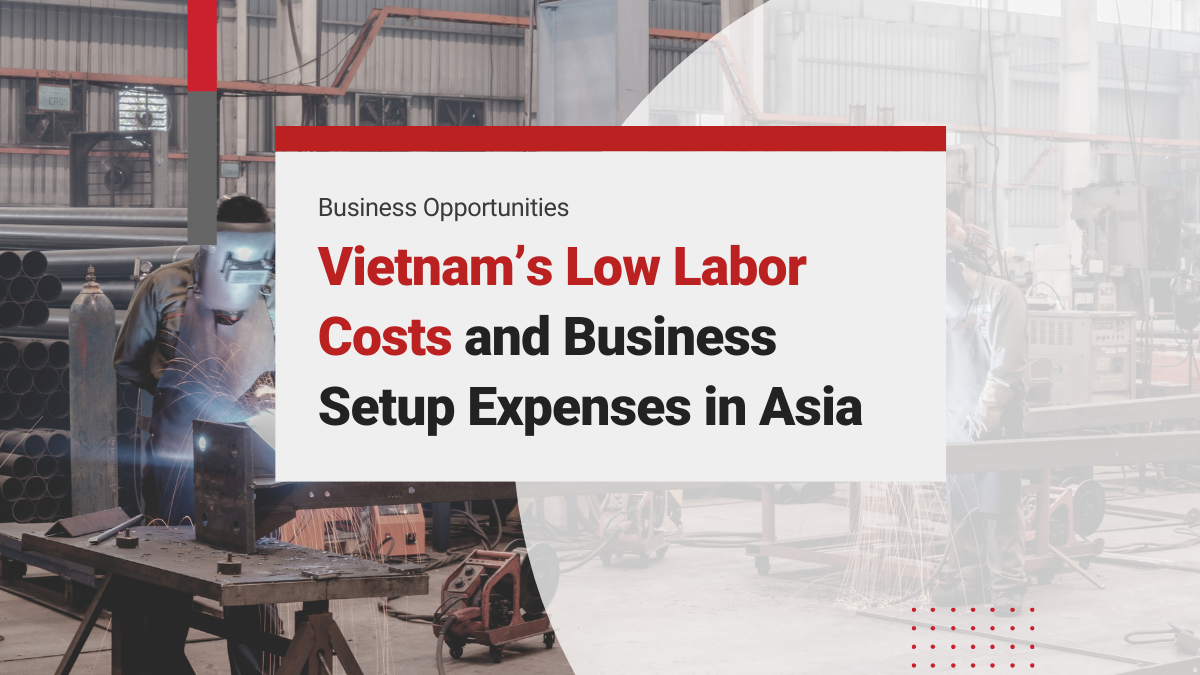Building sustainable supply chains is essential for shaping a greener future. It involves addressing climate change, reducing waste, and aligning with ever-evolving regulations that demand more environmentally responsible practices.
In this article, we explore how Vietnam is stepping up its sustainability game. We examine global regulatory pressures, shifting consumer preferences, the role of green procurement, effective decarbonization strategies, and the country’s move toward a circular economy.
Set Up Your Business in Vietnam with InCorp Vietnam’s Company Registration Services!
Vietnam’s Commitment to Sustainability
Vietnam’s pledge to achieve net-zero carbon emissions by 2050 is a testament to its dedication to environmental sustainability. This ambitious goal underscores the nation’s proactive stance in addressing climate change and its impacts. The government’s introduction of policies such as Decree No. 06/2022/ND-CP exemplifies the regulatory framework being established to regulate greenhouse gas emissions and promote sustainable practices across the board.
Vietnam is adopting innovative green supply chain practices to pursue these sustainability goals. For instance, the use of self-decomposing bags and reusable cold chain boxes is becoming common. These measures reduce non-biodegradable waste and enhance cost efficiency in supply chain operations. Vietnam has developed a set of 158 sustainable development indicators, covering 17 goals and 115 specific targets, to monitor and guide its sustainability progress.
Looking ahead, Vietnam aims to significantly boost the green economy’s contribution to GDP, targeting an increase from US$6.7 billion in 2020 to US$300 billion by 2050. The development of a clean hydrogen ecosystem is expected to contribute US$40-45 billion annually to GDP and create approximately 40,000-50,000 jobs.
Companies like DKSH Vietnam, VinFast, B& Company, etc, have adopted supply chain sustainability measures.
- DKSH Vietnam: DKSH Vietnam focuses on integrating sustainability into its supply chain by emphasizing responsible sourcing, efficient logistics, and waste reduction.
They prioritize working with suppliers who adhere to ethical and environmental standards and conducting audits and assessments to ensure compliance. Their logistics operations are optimized to minimize fuel consumption and emissions, utilizing route planning and efficient transportation modes. DKSH also implements programs to reduce packaging waste and promote recycling, contributing to a more circular economy. - VinFast: VinFast’s approach to supply chain sustainability revolves around its commitment to electric vehicle (EV) production. They are building a vertically integrated supply chain for EV components, including battery manufacturing, to reduce reliance on external suppliers and ensure control over environmental and social practices.
VinFast aims to source materials responsibly, focusing on reducing the environmental impact of battery production and disposal. They are also investing in renewable energy to power their manufacturing facilities, further minimizing their carbon footprint.
Aligning operations with sustainability goals is expected to decrease the overall environmental impact of global supply chains in Vietnam. These collective efforts pave the way for a more sustainable and resilient future, showing that environmental management and economic growth can coexist.
Read More: Vietnam Renewable Energy: Advantages and Growth in the Green Energy Industry
Impact of Global Trading Regulations on Vietnamese Supply Chains
Global trading regulations are reshaping the landscape of supply chains in Vietnam. The European Union’s Corporate Sustainability Due Diligence Directive (CSDDD) is a prime example, requiring companies to conduct regular risk analyses to ensure environmental and social compliance. This directive, along with others like the EU’s Corporate Sustainability Reporting Directive (CSRD) and Carbon Border Adjustment Mechanism (CBAM), is pushing Vietnamese businesses to adhere to stringent international standards to maintain market access.
The impact of these regulations is particularly pronounced in key sectors such as iron, steel, cement, fertilizer, and aluminum. The EU’s carbon pricing on imports from these sectors necessitates that Vietnamese companies implement measures to address environmental and human rights risks throughout their supply chains.
This shift towards sustainable supply chains is not without its challenges, especially for multinational companies striving to enforce sustainability standards among lower-tier suppliers.
Vietnamese companies must navigate global supply chain disruptions and adapt their operations accordingly. Sustainability program compliance and environmental risk mitigation are critical for businesses aiming to stay competitive globally.
Aligning with global trading regulations helps Vietnamese companies mitigate risks, enhance supply chain resilience, and foster sustainable growth. Such alignment not only meets compliance goals but also positions Vietnamese businesses as leaders in sustainable practices globally.
Shifting Consumer Preferences Toward Sustainable Products
Consumers around the world are focused on sustainability, favoring products that are both environmentally friendly and socially responsible. This shift in consumer preferences is influencing market dynamics and compelling companies to integrate sustainability into their supply chain management. Vietnamese enterprises are no exception; they are adapting their operations to meet these evolving expectations, ensuring that their products align with global sustainability goals.
A 2024 survey by PwC revealed that consumers are prepared to pay an average premium of 9.7% for goods produced or sourced sustainably, despite prevailing cost-of-living and inflation concerns.
One of the key strategies being employed by Vietnamese companies like Vinamilk is the reduction of packaging waste. They are actively pursuing strategies to reduce packaging waste through several key initiatives. These include a focus on utilizing low-emission packaging, from design to promoting packaging reuse. Notably, they have implemented milk carton recycling programs, establishing collection points at their stores and even testing automatic sorting machines.
Vinamilk launched the “Pretty Cartons Reborn” program, encouraging consumers, particularly younger generations like Gen Z and Alpha, to collect and recycle used milk cartons. These cartons are transformed into recycled paper or composite panels to create useful items for children. As of October 2024, the program had collected over 180,000 milk cartons, exceeding initial expectations.
In addition, Vinamilk has made strides in reducing plastic use within its distribution processes, such as removing outer film layers from cartons and minimizing plastic spoon inclusion in yogurt products. They are also moving towards more sustainable packaging materials and encouraging consumers to use reusable bags. Furthermore, Vinamilk is working towards a circular economy, where waste is minimized and resources are used efficiently. All of these efforts are contributing to the company’s broader goal of achieving net-zero emissions by 2050.
Sustainable Procurement in Vietnam’s Supply Chain
Embedding sustainability in procurement decisions is crucial for addressing environmental and social issues within supply chains. Vietnamese companies are increasingly focusing on sustainable supply chain management by incorporating sustainability criteria into their procurement processes.
Unilever Vietnam has been proactive in promoting sustainability across its supply chain. In February 2025, the company, in collaboration with the British Chamber of Commerce in Vietnam (BritCham), organized the “Road to Net Zero” training workshop for over 100 suppliers. This initiative aimed to equip suppliers with the knowledge and tools necessary to reduce carbon emissions and transition to more sustainable business practices. The workshop featured representatives from the UK Consulate General, the Ministry of Industry and Trade, and various Unilever suppliers.
By implementing stringent supplier codes of conduct, conducting rigorous audits, and fostering collaborative partnerships, they ensure the responsible sourcing of raw materials. This focus on embedding sustainability into procurement decisions is crucial for mitigating environmental and social impacts, demonstrating a growing commitment to ethical and eco-conscious supply chain management within Vietnam.
Read More: Vietnam’s Carbon Pricing Plan: Reducing Carbon Emissions from Air Travel and Other Sources by 2050
Value Chain Decarbonization
Addressing carbon emissions across all fields is vital for environmental sustainability and regulatory compliance. Value chain decarbonization involves reducing carbon emissions across all three scopes, addressing direct and indirect emissions linked to a company’s operations. Focusing on value chain decarbonization helps companies comply with regulatory requirements and enhance overall sustainability.
Lego is investing over US$1 billion to construct a new factory in Binh Duong province, designed to be carbon-neutral. The facility will feature 7.4 MWp of rooftop solar panels and an additional 50 MW of ground-mounted solar energy on adjacent land to meet its total energy demand, demonstrating a commitment to sustainable manufacturing practices.
Transitioning to a Circular Economy
Adopting circular economy principles helps reduce waste and promotes resource efficiency, leading to sustainable growth. Vietnamese companies are implementing recycling programs and designing products for longer life cycles to support circularity. A structured roadmap is essential for companies to evaluate their current supply chains, pinpoint areas for enhancement, and devise an actionable plan.
Successfully moving to a circular economy requires the creation of circular business models, effective measurement systems for tracking progress, and transformation of the supply chain. The logistics sector plays a pivotal role in this transition, with green logistics practices being crucial for achieving sustainability goals and reducing carbon emissions. Additionally, logistics services can enhance the efficiency of these processes.
Many businesses in Vietnam recognize the importance of transitioning to a circular economy and are taking proactive steps to integrate these principles into their operations. Embracing a circular economy enhances sustainability, reduces environmental impact, and achieves long-term economic benefits for companies.
How InCorp Vietnam Can Help?
InCorp Vietnam empowers businesses to capitalize on Vietnam’s sustainability drive by offering comprehensive support in navigating the complexities of local regulations and implementing sustainable supply chain practices. Their expertise ensures compliance with evolving environmental standards and trading regulations while facilitating the identification and vetting of local suppliers committed to sustainable procurement.

clients worldwide

professional staff

incorporated entities in 10 years

compliance transactions yearly
Learn the Right Setup for Business
Expansion in the Vietnam
Frequently Asked Questions
What is Vietnam's net-zero emissions goal?
- Vietnam aims to achieve net-zero carbon emissions by 2050, reflecting its strong commitment to environmental sustainability.
What are some global trading regulations affecting Vietnamese supply chains?
- Global trading regulations such as the EU's Corporate Sustainability Due Diligence Directive (CSDDD) and the Carbon Border Adjustment Mechanism (CBAM) significantly affect Vietnamese supply chains by mandating regular risk analyses and compliance with sustainability standards. These regulations necessitate that Vietnamese businesses enhance their supply chain practices to meet international sustainability requirements.
How are consumer preferences shifting towards sustainable products?
- Consumer preferences are shifting towards sustainable products, with a growing emphasis on environmentally friendly and socially responsible options. Companies are responding by integrating sustainability into their operations to meet this demand.
What steps are Vietnamese companies taking for sustainable procurement?
- Vietnamese companies are integrating sustainability criteria into procurement processes and conducting supplier assessments along with sustainability audits to promote responsible sourcing. These steps reflect a commitment to sustainable practices in their supply chains.






